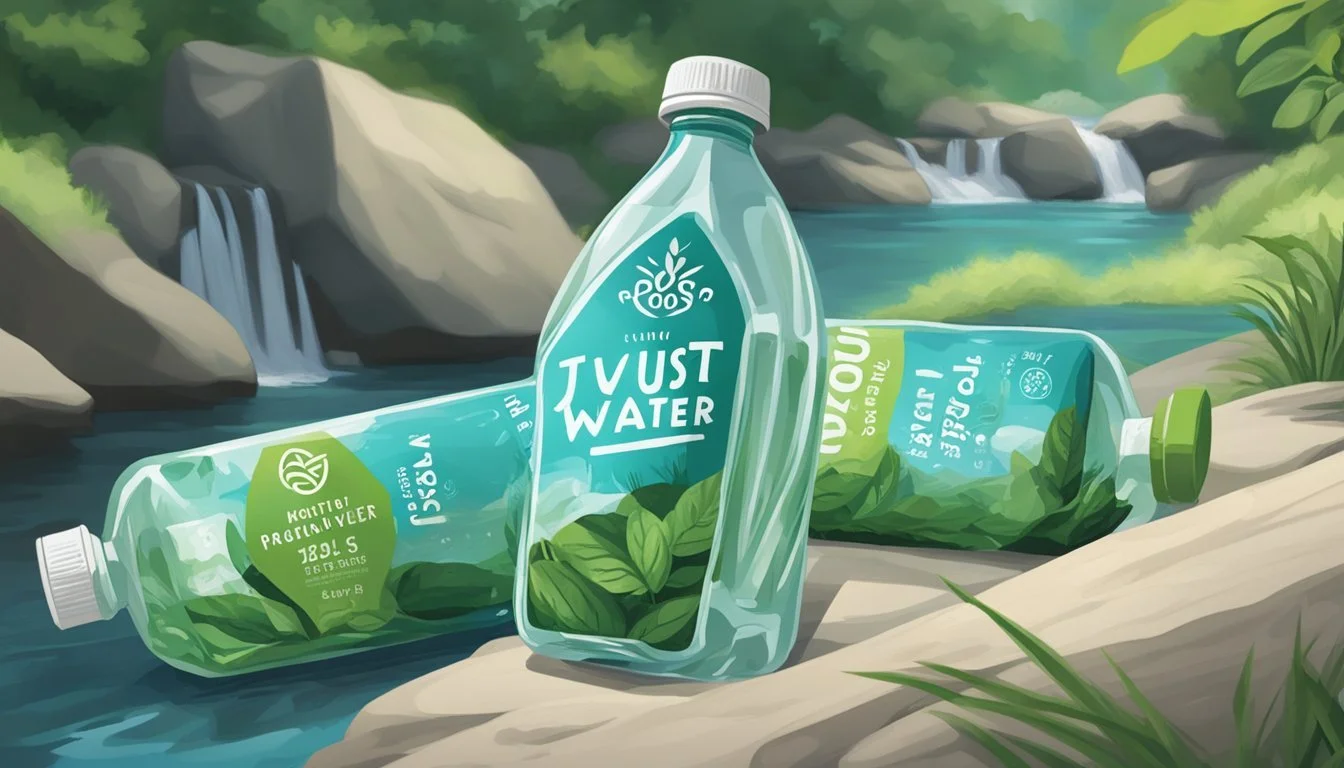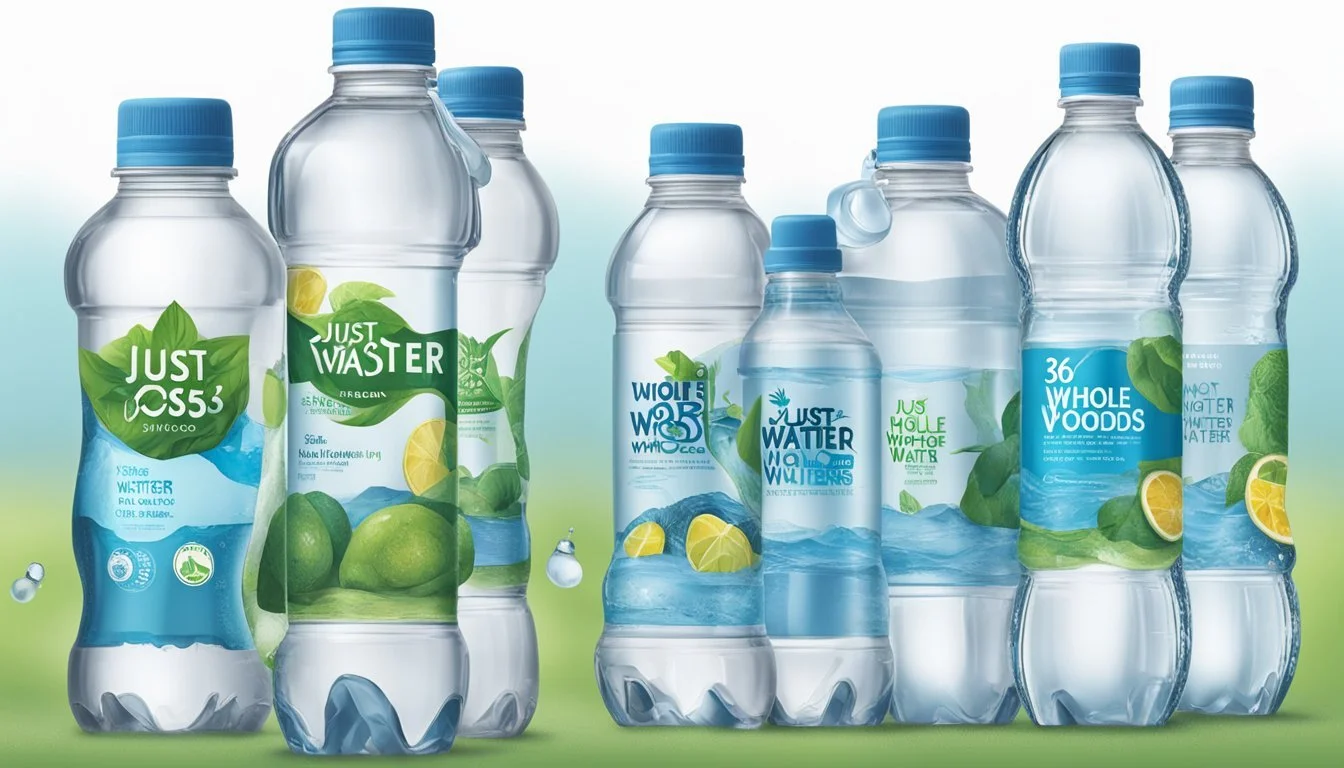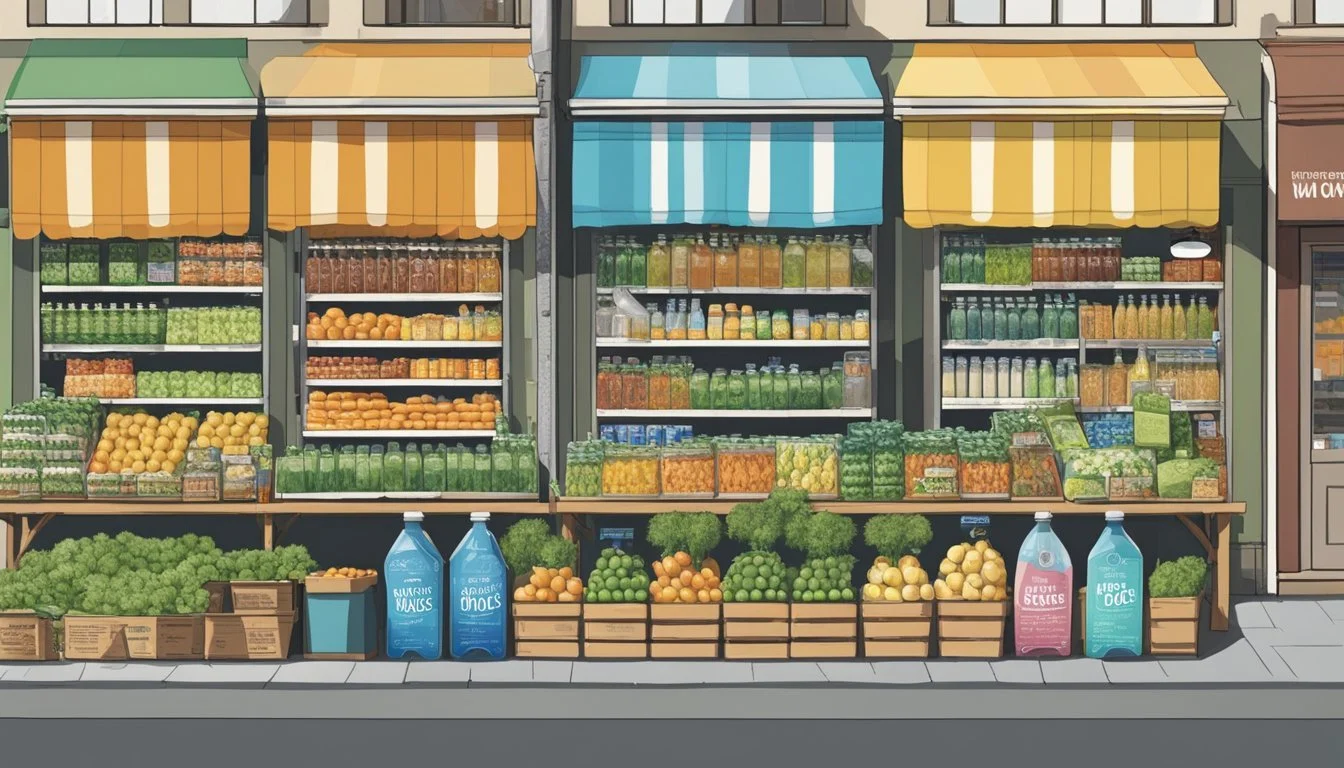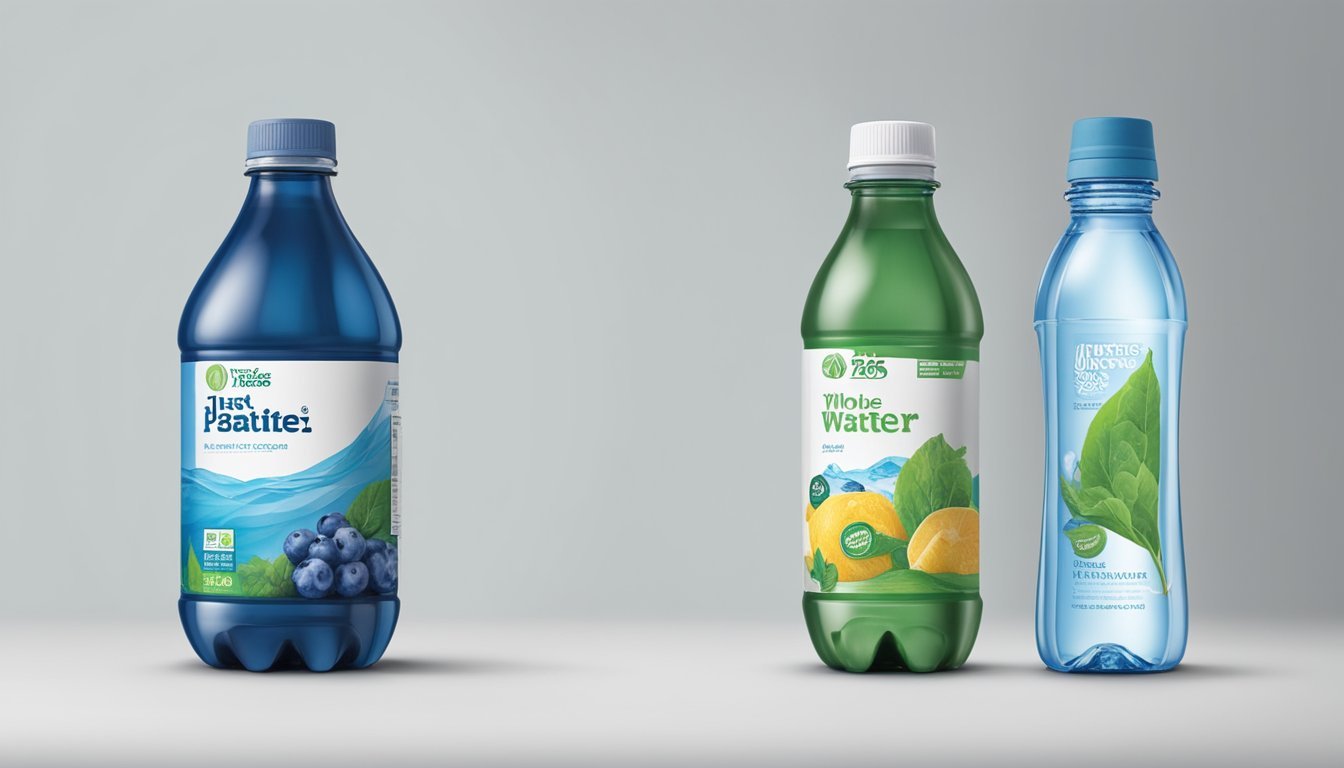Just Water vs. Whole Foods 365
Comparative Bottled Water Analysis
When choosing between Just Water and Whole Foods 365 bottled water, consumers often consider not just taste but also packaging and safety. Consumer Reports has scrutinized the contents of various bottled waters, revealing concerns around chemicals like PFAS, especially in carbonated varieties, affecting numerous popular brands. Hydration remains pivotal, yet the safety and sustainability of these products are equally crucial.
Just Water promotes its use of bio-plastic caps and majority paper-based packaging, aiming to reduce environmental impact and potential chemical leach. It is marketed as a safer, eco-friendly choice, leveraging its BPA-free claim to attract environmentally conscious consumers. Whole Foods 365, on the other hand, offers a range of options including alkaline, electrolyte, and spring water, but has faced mixed reviews regarding taste and potential safety issues.
The decision between Just Water and Whole Foods 365 ultimately comes down to personal priorities. Those emphasizing sustainability and chemical safety might lean toward Just Water, given its packaging claims and focus on reducing plastic use. Meanwhile, shoppers seeking variety in their hydration options at an affordable price might find Whole Foods 365 suitable despite some reservations highlighted in consumer reviews.
History and Philosophy of Brands
This section explores the origins and core values of Just Water and Whole Foods 365 Spring Water, comparing their commitments to sustainability, quality, and community impact.
Origin and Brand Values of Just Water
Just Water, co-founded by Jaden Smith, started in 2012 with a mission to offer sustainable bottled water.
The company focuses on using plant-based packaging, which reduces environmental impact compared to traditional plastic bottles. Just Water sources its water from Glen Falls, New York, emphasizing community partnership by paying a fair price to local municipalities for water.
Their brand values highlight sustainability, ethical business practices, and community engagement. They strive to provide a high-quality product while minimizing ecological footprint through innovative packaging and responsible sourcing.
Whole Foods 365 Spring Water Evolution
Whole Foods 365 Spring Water is a product under the Whole Foods Market's 365 brand, first introduced in 1997.
The brand aims to offer affordable, high-quality products without compromising on natural and organic standards. Sourced from various springs, Whole Foods 365 Spring Water emphasizes purity and taste.
Whole Foods Market's overall philosophy focuses on quality and sustainability, and the 365 brand embodies these principles by providing accessible, budget-friendly options. The evolution of their spring water product line aligns with their commitment to transparent sourcing and environmental stewardship.
Water Source and Composition
When comparing Just Water to Whole Foods 365 Spring Water, it is essential to consider their origins and contents. Both brands emphasize quality, with each providing unique benefits based on their respective sources and compositions.
Evaluating Just Water's Source and Contents
Just Water sources its product from Glen Falls, NY, utilizing a renewable spring water source. The water undergoes minimal processing to preserve its natural mineral content.
Minerals Present:
Calcium: Promotes bone health.
Potassium: Aids in muscle function.
The composition remains balanced, ensuring a neutral pH level, which is crucial for those seeking a stable and pleasant taste. Additionally, Just Water packaging is eco-friendly, consisting mostly of paper and a bio-plastic cap, aligning with sustainability goals.
Assessing Whole Foods 365 Spring Water Quality
Whole Foods 365 Spring Water derives from natural springs, ensuring a high-quality water source. It is subjected to rigorous testing to maintain purity and safety standards.
Types Available:
Electrolyte Water: Enhanced with additional electrolytes.
Alkaline Water: Ionized to a pH of 9.5+.
Minerals and Components:
Calcium and Potassium: Naturally occurring minerals that contribute to overall health.
Whole Foods 365’s spring water options offer variety for consumers, catering to different nutritional needs and preferences. This makes it a versatile choice for a range of hydration requirements.
Purification and Safety Standards
Both Just Water and Whole Foods 365 prioritize high purification and safety standards to ensure their consumers receive safe drinking water. They utilize advanced techniques and comply with stringent regulations to maintain water quality.
Reverse Osmosis and Filtration Processes
Just Water employs a combination of reverse osmosis and other filtration methods to produce purified water. This multi-step process removes impurities, including heavy metals, bacteria, and other contaminants, ensuring a high level of purity.
Whole Foods 365 also utilizes advanced filtration techniques, often involving carbon filtration and reverse osmosis. These methods eliminate a variety of pollutants, including chemical residues and microorganisms, thus providing clean and safe drinking water.
EPA and FDA Compliance
The Environmental Protection Agency (EPA) and the Food and Drug Administration (FDA) set stringent standards for bottled water in the United States. Just Water and Whole Foods 365 adhere to these regulations, ensuring their products meet safety and quality benchmarks.
Both brands also comply with the International Bottled Water Association's (IBWA) voluntary guidelines, which are often stricter than legal limits. This includes maintaining PFAS levels well below the established thresholds, affirming their commitment to delivering water that meets high safety standards.
Health and Wellness Impacts
Hydration and the presence of minerals are critical when choosing bottled water, but it's also important to evaluate potential contaminants, including chemicals such as PFAS and heavy metals like lead and mercury, which could adversely affect health.
Hydration and Mineral Benefits
Just Water and Whole Foods 365 both offer essential hydration. Just Water advertises its alkaline pH level, which some believe contributes positively to acid-base balance. Whole Foods 365, being a spring water, contains naturally occurring minerals.
These minerals include calcium, magnesium, and potassium, which contribute to bone health, muscle function, and electrolyte balance. Hydrating with mineral-rich water can support overall well-being but does not replace a balanced diet.
Although both waters claim similar hydrating properties, consumers must reference the specific mineral listings on their labels for more detailed nutrient information.
Concerns About Contaminants and Chemicals
Contaminants are a serious concern in bottled water. PFAS chemicals, often referred to as “forever chemicals,” have been linked to various health issues, including cancer and developmental defects.
Consumer Reports found PFAS in several bottled water brands, although specific details about Just Water and Whole Foods 365 were not mentioned. Lead, arsenic, and other heavy metals like cadmium and mercury are also potentially harmful. Regular testing and transparency from brands are vital to ensure consumer safety.
When choosing bottled water, inspecting testing reports for possible contaminants is crucial. Verified purity and safety should be a top priority alongside mineral content.
Taste and Water Sommelier Insights
Just Water and Whole Foods 365 offer distinctly different taste profiles, assessed by professional water sommeliers. These experts analyze sensory characteristics to evaluate subtle differences.
Profile and Palate Assessment
Just Water has been praised for its crisp, clean taste with hints of sweet undertones. Water sommeliers have noted that it offers a refreshing experience, highlighting an almost fruity aftertaste. Its source, based in the Adirondack Mountains, lends it a unique mineral composition that enhances its flavor.
Whole Foods 365 presents a more neutral flavor profile. Sommeliers describe it as soft on the palate with minimal aftertaste, making it a versatile option for any occasion. Its consistency and smoothness are attributed to its rigorous filtration process that ensures purity while retaining essential minerals.
Packaging and Environmental Considerations
Boxed Water and Just Water pack their products in ways that attempt to minimize environmental impact. This section reviews the materials used for packaging and the recyclability, as well as their environmental footprint.
Bottle Materials and Recyclability
Just Water uses a package composed primarily of paper (54%), with the remainder being a mix of plant-based plastic (caps) and traditional plastic. This aims to reduce reliance on fossil fuels.
Whole Foods 365 typically utilizes standard single-use plastic bottles, which are highly recyclable, but often end up in landfills due to inadequate recycling practices.
The Environmental Protection Agency supports the use of recyclable and renewable materials, favoring Just Water's approach. Both products aim to reduce waste, but Just Water's plant-based cap adds an innovative touch.
Environmental Impact of Bottles
Just Water reduces carbon emissions by sourcing materials from responsibly managed forests and using renewable energy during production. This significantly lowers their environmental footprint.
Whole Foods 365 has a larger environmental impact due to its traditional plastic bottles. These bottles often accumulate in the ocean, causing significant ecological damage.
Boxed Water and Just Water both aim for sustainable practices by focusing on minimizing waste and reducing carbon footprints. Whole Foods 365 benefits from recycling programs, yet falls short in sustainable innovation compared to Just Water’s comprehensive approach.
Market Presence and Consumer Choices
Just Water and Whole Foods 365 cater to different market niches but both have distinct sales trends and convenience factors that influence consumer choices.
Sales Trends and Brand Popularity
Just Water is known for its eco-friendly packaging, appealing particularly to environmentally conscious consumers. Their sales have been strong among younger demographics that prioritize sustainability. Additionally, endorsements by celebrities have bolstered its market presence.
Whole Foods 365, on the other hand, benefits from the brand loyalty associated with Whole Foods Market. It appeals to shoppers who trust the Whole Foods brand for quality. Reports have indicated that despite the competitive market, Whole Foods 365 maintains consistent sales, especially in regions with multiple Whole Foods locations.
Convenience and Accessibility
Just Water’s packaging, made from renewable resources, makes it lightweight and easy to carry. Availability extends beyond grocery stores to cafes and vending machines, enhancing its accessibility. Its presence in online marketplaces also appeals to the tech-savvy consumer.
Whole Foods 365 benefits from being readily available in Whole Foods’ numerous locations nationwide. Its competitive pricing and packaging sizes cater to both single shoppers and larger families. Additionally, partnerships with delivery services enhance its accessibility, making it a convenient choice for frequent Whole Foods shoppers.
Certifications and Associations
Certifications play a crucial role in establishing the credibility and safety of bottled water brands. Participation in industry associations is also key, ensuring adherence to high standards.
International Bottled Water Association (IBWA)
Just Water and Whole Foods 365 aim to comply with the stringent standards set by the International Bottled Water Association (IBWA). This association emphasizes quality, safety, and environmental stewardship in bottled water production.
IBWA Certification involves multiple criteria such as rigorous testing protocols, adherence to FDA regulations, and following industry best practices. Both brands aim to receive this certification to assure consumers of their commitment to quality.
Their participation in IBWA indicates transparency and trustworthiness. By adhering to IBWA standards, brands contribute positively to consumer health and the environment, setting a benchmark for others in the industry.
Comparative Analysis
This section will focus on the differences in packaging, consumer preferences, and pricing between Just Water and Whole Foods' 365 Everyday Value water brands.
Direct Comparison of Just Water vs. Whole Foods 365
Packaging: Just Water uses a majority paper-based design with a bio-plastic cap, while Whole Foods' 365 Everyday Value bottles are primarily plastic. Just Water’s packaging claims to be more eco-friendly, emphasizing reduced plastic use.
Consumer Preferences: Just Water is marketed towards environmentally-conscious consumers, while 365 spring water appeals to those seeking cost-effective options. Surveys indicate a preference for sustainable packaging, potentially giving Just Water an edge among eco-focused buyers.
Price Point: Just Water is priced higher, generally reflecting its sustainable packaging. On the other hand, Whole Foods' 365 options, such as the Spring Water or Electrolyte Water, are more budget-friendly and available in a variety of types, catering to different consumer needs.
Brand Packaging Target Consumer Price Range Just Water Paper-based, bio-plastic cap Environmentally-conscious Higher Whole Foods 365 Primarily plastic Cost-effective seekers Lower
More About Just Water
Core Hydration vs Just Water: Which Bottled Water is Better?
Icelandic Glacial vs Just Water: Which Bottled Water is Better?
Just Water vs Aqua Carpatica: Which Bottled Water is Better?
Just Water vs Cascade Mountain: Which Bottled Water is Better?
Just Water vs Crystal Geyser: Which Bottled Water is Better?
Just Water vs Hawaii Volcanic: Which Bottled Water is Better?
Just Water vs Hawaiian Springs: Which Bottled Water is Better?
Just Water vs Kirkland Signature: Which Bottled Water is Better?
Just Water vs Mountain Valley Spring Water: Which Bottled Water is Better?
Just Water vs Nestle Pure Life: Which Bottled Water is Better?
Just Water vs Richard's Rainwater: Which Bottled Water is Better?
Just Water vs San Pellegrino: Which Bottled Water is Better?
Just Water vs Solan de Cabras: Which Bottled Water is Better?
Just Water vs Talking Rain AQA: Which Bottled Water is Better?
Just Water vs Whole Foods Italian Still Mineral water: Which Bottled Water is Better?
More About Whole Foods 365
Acqua Pana vs Whole Foods 365: Which Bottled Water is Better?
Alkaline88 vs Whole Foods 365: Which Bottled Water is Better?
Antipodes vs Whole Foods 365: Which Bottled Water is Better?
Aqua Carpatica vs Whole Foods 365: Which Bottled Water is Better?
Arrowhead vs Whole Foods 365: Which Bottled Water is Better?
Big Chill vs Whole Foods 365: Which Bottled Water is Better?
Boxed Water vs Whole Foods 365: Which Bottled Water is Better?
Cascade Mountain vs Whole Foods 365: Which Bottled Water is Better?
Castle Rock vs Whole Foods 365: Which Bottled Water is Better?
Core Hydration vs Whole Foods 365: Which Bottled Water is Better?
Crystal Geyser vs Whole Foods 365: Which Bottled Water is Better?
Deer Park vs Whole Foods 365: Which Bottled Water is Better?
Hawaii Volcanic vs Whole Foods 365: Which Bottled Water is Better?
Hawaiian Springs vs Whole Foods 365: Which Bottled Water is Better?
Ice Mountain vs Whole Foods 365: Which Bottled Water is Better?
Icelandic Glacial vs Whole Foods 365: Which Bottled Water is Better?
Liquid Death vs Whole Foods 365: Which Bottled Water is Better?
Mountain Valley Spring Water vs Whole Foods 365: Which Bottled Water is Better?
Nestle Pure Life vs Whole Foods 365: Which Bottled Water is Better?
Open Water vs Whole Foods 365: Which Bottled Water is Better?
Poland Spring vs Whole Foods 365: Which Bottled Water is Better?
Pure Life vs Whole Foods 365: Which Bottled Water is Better?
Purely Sedona vs Whole Foods 365: Which Bottled Water is Better?
Richard's Rainwater vs Whole Foods 365: Which Bottled Water is Better?
San Pellegrino vs Whole Foods 365: Which Bottled Water is Better?
Simple Truth vs Whole Foods 365: Which Bottled Water is Better?
Smartwater vs Whole Foods 365: Which Bottled Water is Better?
Solan de Cabras vs Whole Foods 365: Which Bottled Water is Better?
Talking Rain AQA vs Whole Foods 365: Which Bottled Water is Better?
Topo Chico vs Whole Foods 365: Which Bottled Water is Better?
Weird Water vs Whole Foods 365: Which Bottled Water is Better?
Whole Foods 365 vs 1907water: Which Bottled Water is Better?
Whole Foods 365 vs BodyArmor: Which Bottled Water is Better?
Whole Foods 365 vs CBD Living: Which Bottled Water is Better?
Whole Foods 365 vs Crystal Lake: Which Bottled Water is Better?
Whole Foods 365 vs Essence pH10: Which Bottled Water is Better?
Whole Foods 365 vs Kirkland Signature: Which Bottled Water is Better?
Whole Foods 365 vs Proud Source: Which Bottled Water is Better?
Whole Foods Italian Still Mineral water vs Whole Foods 365: Which Bottled Water is Better?
Zephyrhills vs Whole Foods 365: Which Bottled Water is Better?








